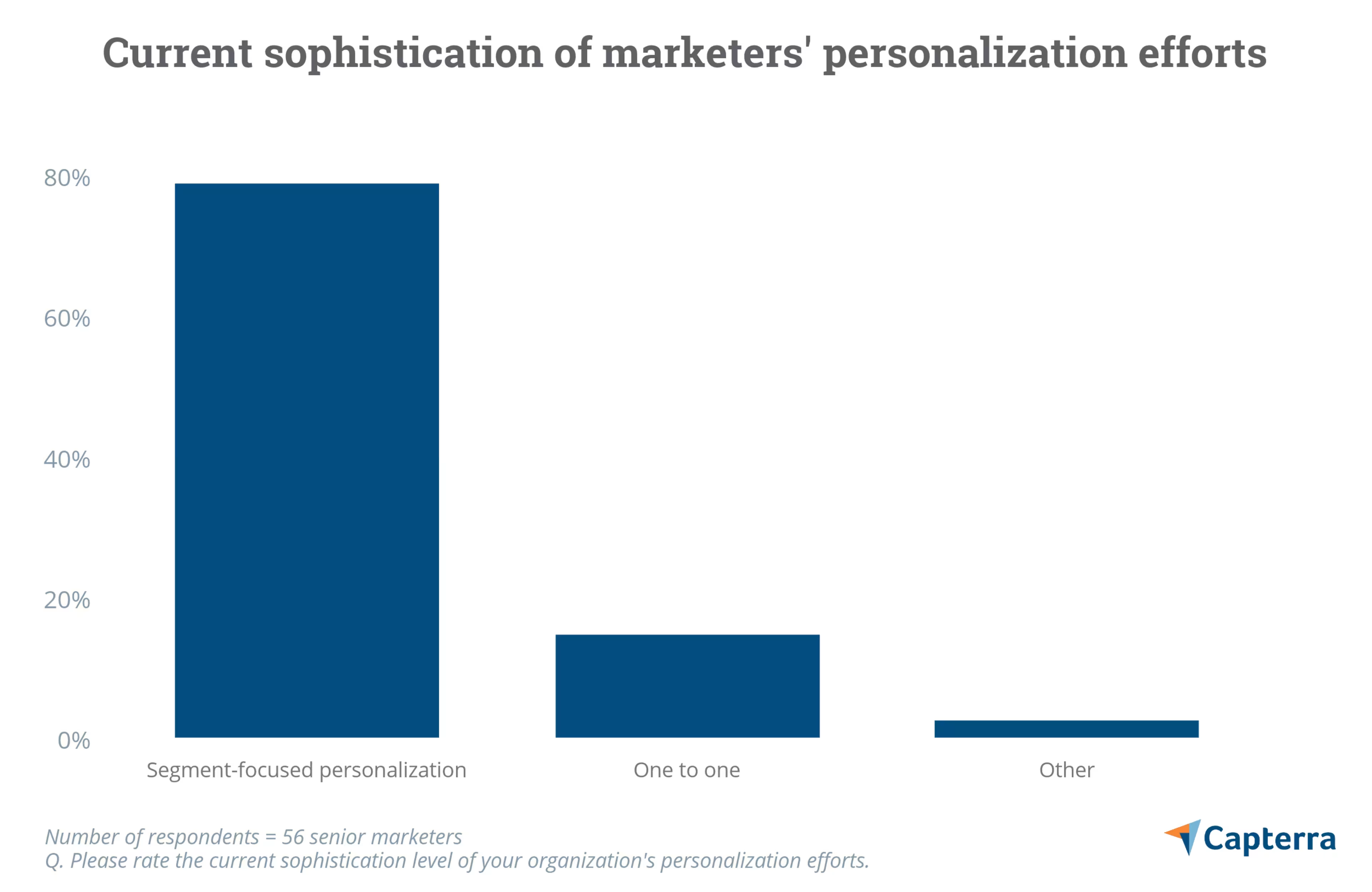Does your marketing team have the technology it needs to succeed in 2019 and beyond?

Now more than ever, technology such as email marketing, marketing automation, and social media marketing software are a mission-critical component of the modern marketing organization.
CMOs tell Gartner that marketing technology acquisition and use are among the top three most vital capabilities that will help them deliver on their marketing strategy over the next 18 months (full research available to Gartner clients).
Now is the time to inventory your marketing tech and make sure your small business has the right tools to thrive.
Marketing leaders and decision-makers in your small business need to understand your existing marketing technologies but should also remain on the lookout for opportunities to implement new technology—real-time personalization, machine intelligence, and augmented analytics, for example—into your marketing strategy.
Let's take a look at three of the most commonly deployed marketing software systems to better understand how advances in marketing technology in those areas could affect your small business this year.
Email Marketing Software: Take email marketing beyond segmentation with personalization
Why email marketing software is a core marketing technology
Email marketing software helps businesses leverage the email channel by optimizing and delivering company newsletters, follow-up emails, and personalized offers. It includes tools such as templates, drip campaigns, and open-rate and click-through tracking.
Email marketing software helps a business check in with customers throughout their customer journey. Marketers use email to support awareness-building and spur selection in the purchasing phase. Email can aid in the ownership phase as well, helping your marketing team to foster customer relationships and build brand advocates.
What email marketing software should you use?
Advanced tech on the horizon: Personalization
Gartner's 2018 State of Personalization Study reveals that 55% of marketing leaders surveyed have devoted more resources to personalization since 2017. (Full research available to Gartner clients.)
The same Gartner survey reports that 84% of marketing leaders aspire to deliver more individualized marketing communications through granular personalization and only 12% of marketing leaders believe their teams have achieved one-to-one personalization via email.

Personalization extends throughout the customer journey, using tailored content and interactions to help customers advance through each stage. For example, Nordstrom uses retargeting emails to promote discounts on brands shoppers previously showed interest in.
Existing personalization capabilities in email marketing software includes audience segmentation, message targeting, and A/B testing.
The future of personalization, whether as standalone software or as part of other existing software types, is tremendously more granular and complex. That future could include real-time tailored website experiences and behavioral targeting based on a shopper's actions, as well as customer-specific recommendation algorithms that update as you shop.
Small-business lookout
Keep an eye on your industry, looking for an uptick in businesses adoption of standalone personalization software. In the meantime, check out my article on how to effectively identify and message to your target markets to make sure your existing email marketing software is up to snuff.
Marketing automation: Apply the power of predictive analytics to your marketing automation with AI
Why marketing automation software is a core marketing technology
Marketing automation software is used for developing, executing, and tracking marketing campaigns on multiple channels. It automates workflows, manages collateral, tracks prospect behavior, and qualifies leads.
Marketing automation lets you implement a digital marketing strategy without having to manually press “send" on each and every email, message, campaign, or post you create. Good automation tools help you identify your audience, design the right content, and automatically trigger actions based on schedules and customer behavior.
What marketing automation software should you use?
Advanced tech on the horizon: AI and predictive analytics
The focus on data in marketing may not be new, but machine learning has begun to rapidly change the game.
Marketing automation and account-based marketing have had a massive impact on how marketers implement strategies and have created a quantifiable approach to measuring marketing impact. These approaches largely analyze data, providing a snapshot that enables marketing practitioners to make assessments and derive decisions for the future.
However, the next wave of marketing transformation will shift from having these activities occur after the fact to consistently triggering marketing events based on real-time transactions. The next generation of analytics provides insights for business decisions in real-time, in the context of historical information, using machine-learning for predictive analysis.
A marketer may have thousands of analytics constantly updating as someone uses their services, applying rules as the customer profile changes. The end result is the one-to-one marketing channel that enables organizations to have real-time engagement.
For example, a customer who liked a certain movie on social media is now in store, and based on their location data, may receive a deal for the same movie's branded merchandise.
Small-business lookout
Full-time data scientists are already appearing in enterprise-level marketing organizations. The role focuses on drawing data from customer behavior and producing predictive and prescriptive insights based on data models and machine learning. As your small business hires for your marketing team, look for candidates with data science experience who can implement some of these practices in your marketing plan.
Social Media: Bring the shopping experience directly to social media
Why social media marketing software is a core marketing technology
Social media marketing software helps companies create, schedule, publish, and track social media marketing campaigns, engage with customers and other users, monitor social channels for brand mentions and sentiment, and source social media influencers.
With the features available in current social media marketing software, your marketing team can also collect and analyze leads data, which can inform not only your engagement strategy but your down-funnel strategy as well.
What social media marketing software should you use?
Advanced tech on the horizon: Decentralized shopping
Social media companies are beginning to partner with Amazon and other smaller vendors to decentralize the shopping experience. For example, consumers can now use Snapchat to shop on Amazon.
Snapchat users can scan a barcode or snap a photo through the app and shop for the item they're looking at. If it's available on Amazon, the user can click through to Amazon to purchase.
This rollout came on the heels of a similar social media shopping advancement within Mark Zuckerburg's media empire.
In March 2018, Instagram announced it would allow businesses to add product "stickers" into their Instagram stories, so they can easily integrate products into their story content and allow viewers to more seamlessly shop for products they see featured in Instagram content.
Small-business lookout
If your small business lists products for sale on Amazon, be ready to take advantage of this technology. The program may be in the early stages of rollout and beta testing but will certainly receive widespread support once it is available nationwide and internationally.
Marketing tools for tomorrow's small business
Continually shifting customer preferences and expectations will shape how marketers use technology in 2019 and beyond, regardless of business size. As these technologies grow, your small business must actively engage with people across multiple touchpoints and contexts.
With this in mind, are you utilizing the foremost technology available to your marketing team? Check out Capterra's software category pages for marketing platforms for small businesses—email marketing, marketing automation, or social media marketing software—to look at product reviews and features lists to make sure your mission-critical marketing software has what your team needs for strategic success.
Thinking about hiring a marketing analytics company for your business needs? Browse our list of top marketing analytics companies and learn more about their services in Capterra’s hiring guide.